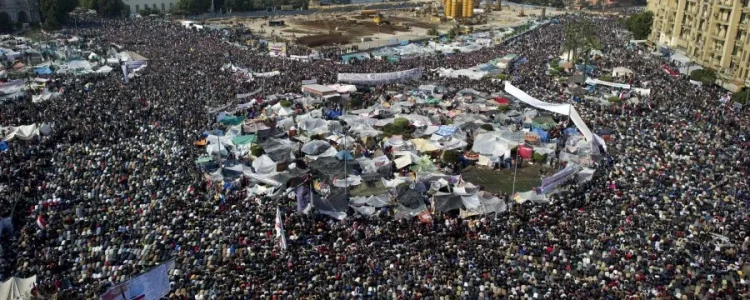Gaze
Donor
- MBTI
- INFPishy
Egypt: Mubarak may step down . . .
Mubarak on the brink of departure
Reuters
Thursday, 10 February 2011
Mubarak on the brink of departure
Reuters
Thursday, 10 February 2011
http://www.independent.co.uk/news/world/africa/mubarak-on-the-brink-of-departure-2210788.html
PEDRO UGARTE/AFP/Getty Images
Egyptian anti-goverment demonstrators wave Egyptian flags at Cairo's Tahrir Square on February 10, 2011 on the 17th day of protests against President Hosni Mubarak's regime.
Egyptian Prime Minister Ahmed Shafiq has told the BBC that President Hosni Mubarak may step down and the situation in Egypt will be clarified soon. and ruling party officials say he will meet protesters' demands.
There is a strong likelihood that he will step down this evening, said the head of the CIA, Leon Panetta.
The president is still in negotiation on whether to hand his powers to Vice President Omar Suleiman, an official said, after unprecedented nationwide protests demanded an end to Mubarak's 30-year-rule. Asked if the president would hand powers to the vice president, the Egyptian official source told Reuters: "It is not decided yet ... It is still in negotiation."
The head of Egypt's ruling party told the BBC on Thursday that he would be surprised if the president was still in power on Friday. Hossam Badrawi told BBC television: "Yes, I would be, because I think the right thing to do now is to take the action that would satisfy... protesters."
Meanwhile an outbreak of strikes across Egypt and the withdrawal by one party from political reform talks compounded the challenge to the president's 30-year rule which has been shaken by the uprising.
Concern among business leaders and the wider population about the economic impact of more than two weeks of revolt is adding to strains facing a cabinet appointed 10 days ago to restore order in the Arab world's most populous nation.
The army, which has provided Egypt's leaders for six decades, continues to stand by, overseeing and praised by pro-democracy demonstrators encamped in Cairo. Tanks and armoured personnel carriers guarded government buildings and main highways.
"The armed forces sticks to the principle of protecting peaceful protesters and it has never, nor will it ever, fire at protesters," said a source from the army, which will play a key role in shaping the next chapter of modern Egyptian history.
Pro-democracy protesters consolidated a new encampment around Cairo's parliament building and the main focus of the opposition, Tahrir, or Liberation, Square remained crowded.
Organisers were promising another major push on the streets on Friday when protesters said they plan to move on to the state radio and television building in "The Day of Martyrs" dedicated to the dead which the United Nations says could number 300.
Washington has pressured Mubarak to speed up the pace of reform but has stopped short of demanding the resignation of the president of Egypt which has a peace treaty with Israel and an army which receives about $1.3 billion in U.S. aid a year.
The friction in the alliance was a reminder of how much has changed in Cairo in two weeks, of how much is uncertain about Egypt's future and the future of U.S. influence over a region whose autocratic rulers struggle to contain social discontent.
Saudi Arabia's King Abdullah told Obama that his country would prop up Mubarak if the United States withdrew its aid programme, according to Britain's The Times. Abdullah told Obama not to humiliate Mubarak in a telephone call on Jan. 29, the newspaper said, citing a senior source in Riyadh.
In a further sign of concern in the kingdom's ruling elite about upheaval in Egypt, Saudi Arabia's Foreign Minister Saud al-Faisal said on Thursday: "We express our strong condemnation of meddling by some foreign countries in Egypt's affairs."
Vice President Omar Suleiman, a former general and intelligence chief, has spearheaded talks with opposition groups including Islamist movement the Muslim Brotherhood, which would have been unthinkable before Jan. 25.
Criticised in Washington for suggesting Egypt was not ready for democracy, Suleiman, who has become the voice of the leadership, has said there is a road map to hand over power and that his remarks on democracy were taken out of context.
An Egyptian opposition party, however, pulled out of talks on reform with Suleiman, saying Mubarak's administration had not responded "to the minimum level of popular demands".
The Tagammu Party was the first group to announce its withdrawal from the dialogue which Suleiman began on Sunday.
Thousands of Egyptian workers staged new strikes, sit-ins and protests on Thursday, demanding better working conditions and wages.
The strikes spread across companies and government agencies in sectors including bus transport, railroads, food production, textiles, electricity and petroleum, although most said they were not connected to protests seeking Mubarak's ouster.
It is still unclear whether Egypt's unions, fractured and dispersed, can gain momentum and act in unison as happened in Tunisia, where an uprising unseated the president last month.
But the acceleration of the strike movement could push the country's army, now limited mostly to guarding streets and state buildings, to step in to avert economic paralysis, analysts say.
"This could be the second wave of this revolution. And definitely it creates a new reality that any future government has to deal with," Gamal Soltan of the al-Ahram Centre for Political and Strategic Studies said.


